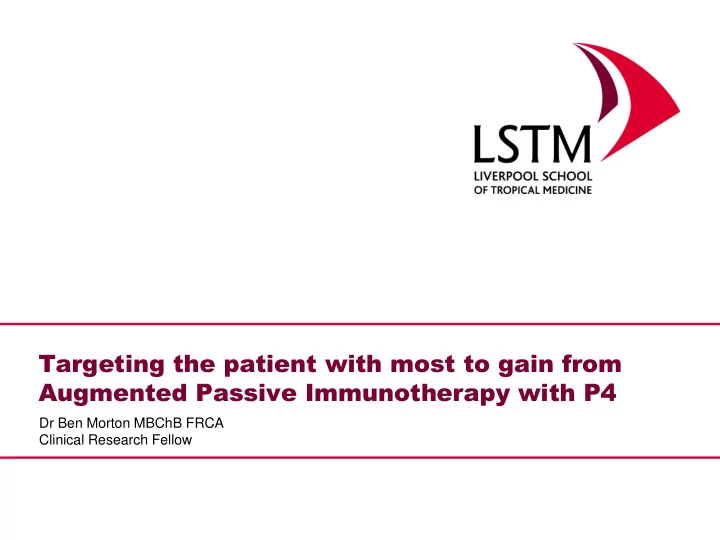

Targeting the patient with most to gain from Augmented Passive Immunotherapy with P4 Dr Ben Morton MBChB FRCA Clinical Research Fellow
Background • Severe sepsis is a major international public health problem • Effective therapy limited • Source control • Antibiotics • Organ support (Surviving Sepsis Campaign) • Mortality remains ~38% for septic shock Mckenna, M. Nature 2013 (499): 394-396 2
P4 Peptide Discovered CDC Atlanta 2006: Eddie Ades & Shankar Rajam Peptide fragment Pneumococcal surface adhesin A – PsaA Highly conserved peptide, easily synthesized: 251 LFVESSVKRRPMKTVSQDTNIPIYAQIF 278 Activates phagocytic cells 3
Augmented passive immunotherapy Pathogen opsonised by antibody P4 P4 enhances Fc γ R expression on phagocyte ↑ Phagocytosis 4
P4 Translational Programme • In vitro testing • Cell lines – HL-60, neutrophils, macrophages • Romero-Steiner. Vaccine 24 (2006) 3224 – 3231 • Rajam G. Microbial Pathogenesis 44 (2008) 186 – 196 • In vivo testing • Murine invasive pneumonia models • Rajam G. JID. 2009; 199:1233 – 8 • N Melnick. Clin & Vaccine Immun. 2009 (16)6: 806 – 810 • Rajam G. Clin & Vaccine Immun. 2010 (17)11:1823-1924 • Rajam, G. Int. J. Microbiol. 2011, 725483 (2011). • Weeks, JN. Antimicrob. Agents Chemother. 55, 2276 – 81 (2011). • Bangert, M. J. Infect. Dis. 205, 1399 – 407 (2012). • E. Coli, Klebsiella and Pseudomonas models in progress • Ex vivo testing • Healthy volunteer neutrophils & alveolar macrophages • Bangert, M. Antimicrob. Agents Chemother 2013 57(9):4566-9. 5
Collaboration Professor Stephen Gordon Professor Aras Kadioglu Dr Eddie Ades Sister Angela Wright Ms Suzanna Gore Dr Shankar Rajam Dr Daniela Ferreira Dr Mathieu Bangert Dr Dan O’Neill Dr Jamie Rylance Dr Andrea Collins Ms Emma Dearing Mrs Jane Ardrey Supported by: Dr Robert Parker Dr Ingeborg Welters Dr Ben Morton Sister Karen Williams Sister Lynne Keoghan Sister Anna Walker Sister Colette Seasman Charge Nurse David Shaw 6
Aims & Objectives 1. Can P4 peptide augment phagocytic response in severe pneumonia? • Hypothesis ( REC Ref: 12/NW/0730 ) • Augmented passive immunotherapy using P4 peptide improves ex vivo 2. Which patients are most likely to benefit from Augmented Passive phagocytic activity in patients with severe community-acquired pneumonia Immunotherapy? admitted to critical care • Work Package 1 : Proof of concept • Inclusion criteria • 25 critically ill patients with severe community-acquired pneumonia • Adults (>18) within 48hrs admission to critical care • Ex vivo stimulation of neutrophils and alveolar macrophages to determine effect • Severe community-acquired pneumonia (BTS guidelines) on bacterial killing • Exclusion criteria • Completed April 2014 • Hospital admission within 14 days, pregnancy and or immunocompromising condition / therapy • Work Package 2 : Determinants of activity • 75 critically ill patients with severe sepsis • Blood samples and bronchoalveolar lavage if clinically indicated • Source (respiratory, abdominal or urogential infection) • Phase (early, latent and convalescent) • Clinical and laboratory determinants of activity • Currently recruiting 7
Conclusions • WP1: Augmented passive immunotherapy improves bacterial killing by phagocytes in patients with severe community acquired pneumonia • WP2: In progress, currently recruited 46/75 patients • Promising results in abdominal and urogenital sepsis • Clear potential as a therapeutic agent moving forwards • Work underway to define individuals and indications 8
Developmental programme • WP1 MRC Developmental Pathway Funding Scheme success • Commercial peptide production • Pre-clinical toxicology studies • Application for MHRA Clinical Trials Authorisation • Future plans • First in human trials • Partnership with Royal Liverpool Clinical Research Facility • Commercial partnership • Fully flexible agreement with Grifols Inc. 9
Potential future applications • Adjunctive therapy for severe pneumonia / sepsis • Multi-drug resistant organisms • Antimicrobial independent mechanism of action • Surgical prophylaxis • Orthopaedic joint surgery, resistant skin commensals • General surgical prophylaxis if Gram negative activity • Clostridium difficile diarrhoea • Antibiotic avoidance 10
Recommend
More recommend